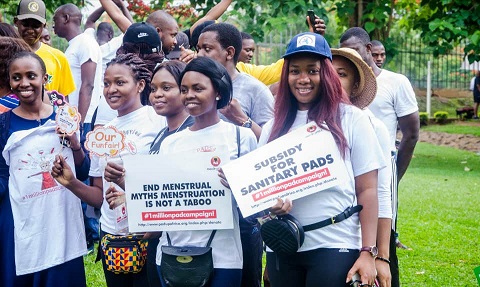Menstrual hygiene products are classified as luxury products and heavily taxed, making it unaffordable for women and girls in low-income homes and deprived communities in the country.
The government has, therefore, been urged to remove the 20 per cent import duty tax and the 12.5 per cent Value Added Tax (VAT) on sanitary products to make it less expensive and accessible to women and girls.
The founder of Period Matters, Ms Able Delalie, who made the call in an interview, said “periods is not a woman’s thing but everyone’s business” and it is important for all hands to be on deck to demystify myths, do away with all the misconception and help women and girls to feel comfortable about their periods.
“If we celebrate pregnancy and birth, we can also celebrate menstruation”, she said.
Period Matters is an organisation that is committed to tackling menstrual issues through education, service and policy.
World Menstrual Hygiene Day was observed on May 28. The day is marked to change the social stigma associated with menstruation.
This year’s theme was “Periods in Pandemic”. The theme was to highlight how the challenges faced by women during menstruation had worsened due to the COVID-19 pandemic.
Ms Delalie said the pandemic had exposed how dire it was to make sanitary products available and affordable .
“Economic disruptions can lead to women and girls losing access to hygiene products leading to unhygienic ways of collecting blood”, she said.
She said it was important for government and all stakeholders to put in measures to end period poverty which was the lack of access to sanitary products, menstrual hygiene education, toilets and hand washing facilities.
She said the lack of access to sanitary pads created by the tax could affect their sexual and reproductive health or increased infections because they used unhygienic products such as rags or one sanitary pad for a prolonged period; missed school while some might drop out of school.
According to ActionAid, a charitable organisation, one in 10 girls in Africa missed school because they did not have access to sanitary products or because there were no safe, private toilets to use at school.
Additionally, she said the non-affordability of sanitary pads could make girls dependent on others and vulnerable to predators because there were stories of girls exchanging sex for money for sanitary pads.
Also, it could lead to lack of confidence or self-esteem because of the shame and stigma associated with menstruation.
She said Kenya and South Africa had reviewed taxes on sanitary products adding that Kenya spent at least $3 million annually to provide free sanitary products for girls.
In January, this year, Nigeria also waived VAT on locally manufactured sanitary products.
Ms Delalie said “it is time for action” and called on government, policymakers and all stakeholders to make sanitary products available for free everywhere – in washrooms, schools, workplaces, hotels for women and girls to have access to them when the need arose.

